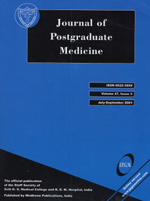
|
Journal of Postgraduate Medicine
Medknow Publications and Staff Society of Seth GS Medical College and KEM Hospital, Mumbai, India
ISSN: 0022-3859 EISSN: 0972-2823
Vol. 52, Num. 4, 2006, pp. 325-325
|
Journal of Postgraduate Medicine, Vol. 52, No. 4, October-December, 2006, pp. 325
Letter To Editor
Incentives to encourage peer review
Choi BCK
Centre for Chronic Disease Prevention and Control, Public Health Agency of Canada (PHAC), Government of Canada, Ottawa; Department of Public Health Sciences, University of Toronto, Toronto; Department of Epidemiology and Community Medicine, University of Ottawa, Ottawa, Ontario, Canada
Correspondence Address:Centre for Chronic Disease Prevention and Control, Public Health Agency of Canada (PHAC), Government of Canada, Ottawa; Department of Public Health Sciences, University of Toronto, Toronto; Department of Epidemiology and Community Medicine, University of Ottawa, Ottawa, Ontario, Canada Email:
bernard_choi@phac-aspc.gc.ca
Code Number: jp06110
Sir,
Usually, the peer reviewers are not paid for their time or efforts and their contribution is not formally acknowledged.[1],[2] Senior researchers often delegate the task of review to their graduate students. Alternatively, many busy researchers often decline to review manuscripts, write the reviews in haste or send in their comments late. All these have an adverse impact on the quality and efficiency of the peer review system and add little to the quality of submission to journals.[3],[4],[5],[6],[7]
Several types of incentives have been suggested to encourage reviewers: free access to journal, acknowledgment on journal website, feedback from editor,[7] appointment to editorial board, consultant fee, open peer review[1],[7],[8],[9] and published acknowledgement of reviewer′s contribution to the manuscript.[8]
These incentives, however, are not without limitations. For many researchers, their institutions already have subscriptions to journals, so free access may not mean much. Acknowledgment on journal website is only for the reviewers to cherish memories of their work during the year and adds very little to their promotion dossiers. Feedback from the editor means more reading; and appointment to an editorial board means more work for some. Consulting fee can be an incentive but journals are not prepared to pay ongoing rates. Publishing the reviewer′s name alongside the manuscript could, in fact, act as a deterrent for providing an honest opinion during the review process.[1],[8],[9] Signed reviews have been found to be more tamed in opinion and more likely to recommend publication, than anonymous reviews.[1] Junior reviewers, for example, would be particularly reluctant to openly criticize the work of senior researchers for fear of reprisal, especially if their livelihoods depend on winning grants.[8]
Reviewers, who are generally senior researchers, have several publications to their credit. They are very keen to publish their work and views for several reasons: the urge to publish, fame and recognition brought by publication, satisfaction for contribution to science, sense of creating a legacy for posterity and advancement of career.[10]
We have noted that lately, commentaries have been printed alongside certain articles published in the Journal of Postgraduate Medicine (JGPM) .[11],[12] The JGPM editors request reviewers, who have done a good job, to pen these commentaries to help "elucidate relevant points, bring out finer nuances of the topic and assist the readers by providing new perspectives". We think that inviting peer reviewers to publish a short commentary along with the manuscript is a novel incentive for reviewers. It could make reviewers compete for writing excellent reviews and reward them with an opportunity to publish. A short commentary is easier to read and a reader after reading the commentary could get interested in the original article. In addition, such commentaries could provide a different perspective from the reviewers.
Further research, possibly another survey[13] or a randomized controlled trial of peer reviewers,[3] would be needed to substantiate the effectiveness and feasibility of the solution proposed here.
References
| 1. | Walsh E, Rooney M, Appleby L, Wilkinson G. Open peer review: A randomised controlled trial. Br J Psychiartr 2000;176:47-51. Back to cited text no. 1 [PUBMED] [FULLTEXT] |
| 2. | Gitanjali B. Peer review - Process, perspectives and the path ahead. J Postgrad Med 2001;47:210-4. Back to cited text no. 2 |
| 3. | Drummond R. Peer review in Prague. JAMA 1998;280:214-5. Back to cited text no. 3 |
| 4. | Kaandorp CJ. Peer review in biomedical publication: 4th International Congress, 14-16 September 2001, Barcelona. Sci Editor 2002;25:44-5. Back to cited text no. 4 |
| 5. | Bacchetti P. Peer review of statistics in medical research: The other problem. BMJ 2002;324:1271-3. Back to cited text no. 5 [PUBMED] [FULLTEXT] |
| 6. | Purcell GP, Donovan SL, Davidoff F. Changes to manuscripts during the editorial process. JAMA 1998;280:227-8. Back to cited text no. 6 [PUBMED] [FULLTEXT] |
| 7. | Smith R. Promoting research into peer review. BMJ 1994;309:143-4. Back to cited text no. 7 [PUBMED] |
| 8. | Smith R. Opening up BMJ peer review. [Editorial]. BMJ 1999;318:4-5. Back to cited text no. 8 |
| 9. | Godlee F. Making reviewers visible. JAMA 2002;287:2762-5. Back to cited text no. 9 [PUBMED] [FULLTEXT] |
| 10. | Choi BC, Pang T, Lin V, Puska P, Sherman G, Goddard M, et al . Can scientists and policy makers work together? J Epidemiol Commun Health 2005;59: 632-7. Back to cited text no. 10 |
| 11. | Piper SN. Prophylaxis of postoperative nausea and vomiting: Gabapentin a new anti-emetic approach? J Postgrad Med 2006;52:100-1. Back to cited text no. 11 |
| 12. | Choi BC. The interesting concept of applying the WHO STEPS data collection approach to the industrial setting. J Postgrad Med 2006;52:172-3. Back to cited text no. 12 |
| 13. | Drummond R, Flanagin A. The Second International Congress on Peer Review in Biomedical Publication. JAMA 1994;272:91. Back to cited text no. 13 |
Copyright 2006 - Journal of Postgraduate Medicine
|
